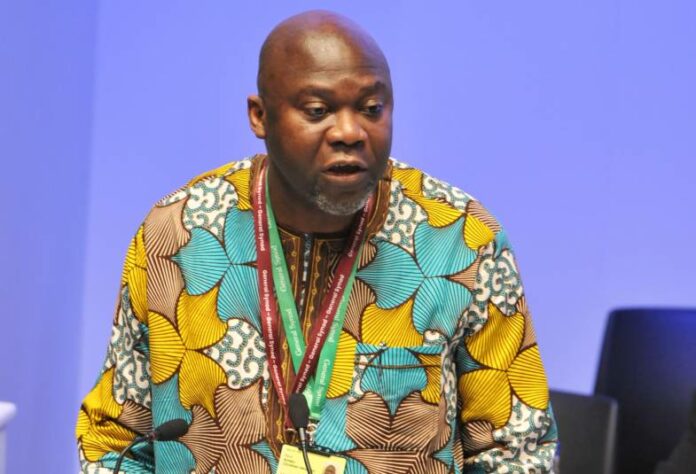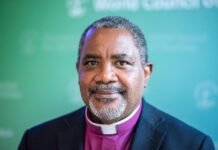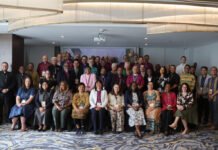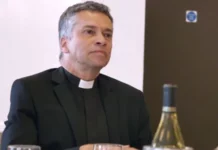The Church of England’s General Synod has endorsed a motion from the Diocese of London highlighting the plight of the persecuted Church, and calling for the creation of a day of prayer for Christians who face oppression and violence around the world.Sam Atkins/Church of England
A background paper highlighted the plight of millions of Christians worldwide facing high levels of persecution and discrimination for their faith. In North Korea, where Christianity is illegal, believers risk imprisonment, torture, or execution. Similarly, in parts of the Middle East like Iraq and Syria, extremist groups like ISIS have targeted Christians, leading to mass displacement and atrocities.
In China, the government imposes strict regulations on religious practices, frequently raiding and demolishing unregistered churches. Sub-Saharan Africa also sees severe persecution, with Nigeria’s Boko Haram attacking Christian villages, churches, and schools, resulting in countless deaths and abductions. In Pakistan, blasphemy laws are often misused to unjustly imprison Christians and incite mob violence against them.
A 2024 report by ‘Open Doors’ concluded that 317 million Christians face ‘very high or high levels of persecution’ across its ranking. This equates to 1 in 7 Christians worldwide. Geographically, it found that one in five Christians face persecution in Africa and two in five Christians face persecution in Asia. The top five countries are: North Korea, Somalia, Libya, Eritrea and Yemen.
Background information provided to Synod members also highlighted existing initiatives to highlight the plight of persecuted Christians, including #RedWednesday and The International Day of Prayer for the Persecuted Church – together with initiatives more broadly aimed at promoting Freedom of Religion or Belief (FoRB) such as the International Day Commemorating the Victims of Acts of Violence Based on Religion or Belief.
The Pew Research Centre has reported that overall FoRB is in decline, paralleling the global deterioration of democracy and human rights in general. Its 2024 report found that government restrictions on religion – laws, policies and actions by state officials that limit religious beliefs and practices – reached a new peak globally in the year it covers (2021). Harassment of religious groups and interference in worship were two of the most common forms of government restrictions worldwide in 2021.
As a response to this crisis, the Synod backed the motion which highlights the issue and proposes a national ecumenical day of prayer and action dedicated to the persecuted church.
This follows an earlier motion (2022) which condemned persecution of Christians around the world.
Introducing the motion, Revd Preb Dr Amatu Christian-Iwuagwu, Area Director of Mission and Racial Justice for the Diocese of London, said:
“The extent of Christian persecution worldwide is vast and multifaceted, impacting millions of believers across numerous regions. This persecution includes social and economic discrimination, legal restrictions, physical violence, and imprisonment, severely affecting Christian communities.
“Despite these challenges, the resilience and faith of persecuted Christians continue to inspire and call for global awareness, advocacy, and support. By understanding and addressing this persecution, we can work towards a world where religious freedom is upheld and protected for all.”
Supporting the motion, the Bishop of Winchester, Philip Mounstephen, said: “FoRB and the persecution of Christians matters because of its broad impact. But it matters too because we live in an increasingly ideologically and indeed theologically driven world.
“But the biggest threat is from overbearing, authoritarian nationalistic governments who are bolstered by their own particular theology: so Putin’s regime in Russia is bolstered by the concept of Russkiy Mir: a theology shamefully expounded by the Russian Orthodox Church.
“President Xi’s ambitions for Chinese hegemony are bolstered by the ancient concept of Tianxia: literally ‘all under heaven’ – a geopolitical system with China at the centre and Xi at the centre of the centre.
“All these ideologies are very bad news for minorities of every sort, and bad news for the wider world too.”
The motion passed was as follows:
‘That this Synod, in the light of the motion passed at the February 2022 Group of Sessions relating to the persecuted Church (i.e. item 18 on the Agenda, as amended), request the Archbishops’ Council to work ecumenically with other churches to establish a national day of prayer and action for the persecuted Church around the world.’
Votes recorded were as follows:
- For: 230
- Against: 0
- Abstained: 1



